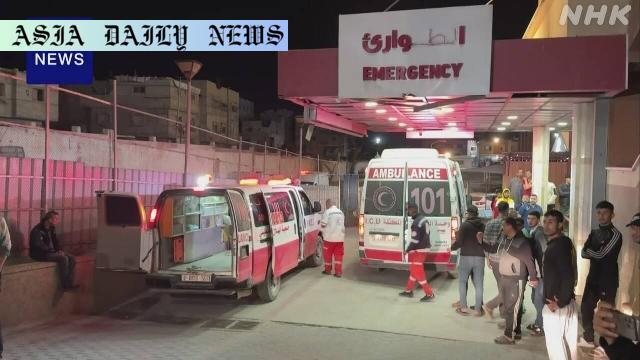Gaza Crisis: Israel set to expand its Gaza offensive, intensifying the humanitarian crisis, with alarming casualties reported daily.
Israeli government plans a new phase of its Gaza offensive amidst unfolding humanitarian concerns.
Death toll in Gaza has reached 52,495, with 77 deaths in just the last 48 hours.
Less than a third of Gaza is deemed safe, and humanitarian aid has been blocked since March.

Escalation in Gaza Offensive
The ongoing conflict in Gaza has reached a grim milestone as the Israeli government is poised to approve an expansion of its military campaign. According to reports from health officials in Gaza, the death toll has soared to a staggering 52,495 as of October 2023, with 77 lives lost within the past 48 hours alone. The United Nations has expressed significant concern over these developments, particularly given the already dire humanitarian conditions in the region.
On Saturday, the southern Gaza city of Khan Younis witnessed severe airstrikes, resulting in significant casualties. Disturbing imagery captured by media outlets highlights the impact of these strikes, including children among the wounded and deceased. One particularly harrowing scene involved a young girl who succumbed to injuries after being rushed to a hospital in critical condition. These incidents have raised calls for international intervention and amplified concerns about the safety and protection of civilians, especially women and children.
Humanitarian Crisis Worsens Amid Blockade
The humanitarian situation in Gaza has reached an unprecedented level of severity. Since March, the Israeli government has blocked the inflow of essential humanitarian supplies, further exacerbating the struggles of the local population. The United Nations has reported that less than one-third of the territory is now considered safe for habitation. As Israeli forces issue evacuation notices ahead of their attacks, many residents face displacement and a lack of access to basic necessities, such as food, water, and medical supplies.
The escalation of military activity raises fears of further deterioration in living conditions. Humanitarian organizations have expressed alarm over the limited scope of international aid and the insufficiency of medical facilities to handle the growing number of casualties. The situation has placed immense strain on local hospitals, which are struggling to treat the injured with dwindling resources.
Political Ramifications and Global Response
As the Israeli Cabinet prepares to endorse plans for an escalated offensive, political analysts predict a complex web of consequences at both regional and global levels. The intentions to intensify pressure on Hamas have been met with divided opinions from the international community. While Israel maintains that its actions are aimed at dismantling militant operations, critics argue that the indiscriminate effects on civilians render these measures disproportionate and devastating.
Global leaders have called for restraint and dialogue, emphasizing the need for adherence to international laws governing armed conflicts. However, with no immediate resolution in sight, the region faces the risk of prolonged violence and generational trauma. The compounded effects of physical destruction and emotional scars are likely to set back Gaza’s redevelopment and stability for years to come.
Calls for Humanitarian Intervention
The worsening situation has prompted renewed calls from humanitarian organizations and rights groups for urgent intervention. They stress the importance of reopening supply channels to deliver critical assistance to those in desperate need. Additionally, there are appeals for international mediators to broker ceasefire negotiations to prevent further loss of life and safeguard civilian populations.
Amidst these efforts, the resilience of the Gaza people stands out. Despite the immense pressures of war, blockades, and displacement, communities continue to exhibit remarkable courage and solidarity. Stories of localized aid campaigns and acts of compassion underscore the indomitable spirit of the region’s residents amid unimaginable conditions.
While the international community watches, the course of action taken in the coming weeks will significantly shape not only the future of Gaza but also the broader dynamics of peace and security in the Middle East.
Commentary
The Need for Immediate Humanitarian Action
The escalating crisis in Gaza serves as a sobering reminder of the devastating human cost of conflict. With over 52,000 lives lost, and the toll rising daily, the urgency for immediate humanitarian intervention cannot be overstated. The blockade on essential supplies, which has been in place since March, has exacerbated an already precarious situation for the people of Gaza. It is imperative for the international community to step in and address the worsening conditions before the situation spirals further out of control.
One of the most troubling aspects of this crisis is the impact on vulnerable populations, particularly women and children. Reports of civilian casualties, including children injured or killed in airstrikes, highlight the indiscriminate nature of the violence. Hospitals stretched to their limits and the lack of safe zones for residents exacerbate the dire conditions. It is clear that the current trajectory of the conflict is unsustainable and will only lead to further loss of life and destruction.
International Responsibility and Call for Peace
The responsibility for addressing this crisis does not lie solely with the conflicting parties but also with the global community. Nations and international organizations must prioritize diplomatic efforts to negotiate ceasefires and ensure the delivery of humanitarian aid. The human rights violations occurring in Gaza cannot go unnoticed, and holding those responsible accountable is crucial for restoring a sense of justice and humanity.
As the death toll rises and the humanitarian crisis deepens, it becomes increasingly evident that military solutions are not the answer. Long-term peace and stability in Gaza and the greater Middle East will only be achieved through dialogue, empathy, and an unwavering commitment to human rights. The time to act is now, and this crisis must serve as a rallying point for global solidarity and action.


